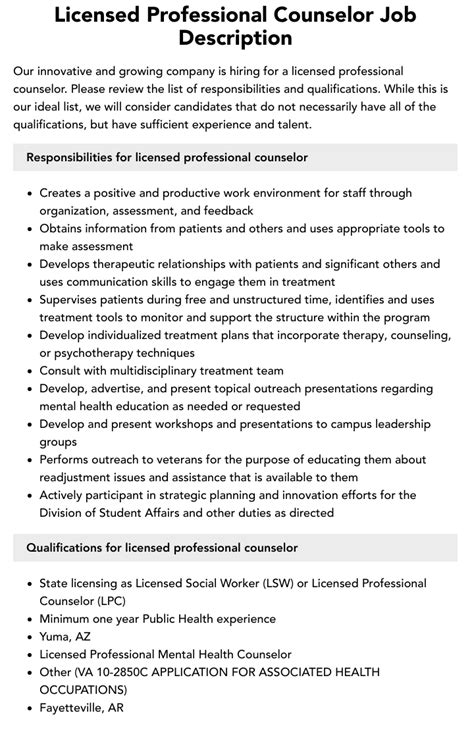Intro
Discover the rewarding career opportunities and growth prospects of Licensed Professional Counselor jobs. Explore the diverse roles, salary ranges, and industry demands for LPCs. Learn how to leverage your skills and expertise to advance in this in-demand field, from mental health counseling to private practice and beyond.
The demand for mental health services has been on the rise in recent years, and this trend is expected to continue in the coming years. As a result, licensed professional counselor (LPC) jobs are becoming increasingly sought after. If you're considering a career as an LPC, you're likely wondering what opportunities are available and how you can grow in your career.
The role of an LPC is to provide mental health counseling services to individuals, groups, and families. LPCs work in a variety of settings, including private practice, hospitals, clinics, schools, and non-profit organizations. They help clients cope with a range of issues, including anxiety, depression, trauma, and relationship problems. LPCs also work with clients to develop coping strategies, improve communication skills, and enhance overall mental well-being.
Job Opportunities for Licensed Professional Counselors

There are many job opportunities available for LPCs, and the field is expected to continue growing in the coming years. According to the Bureau of Labor Statistics (BLS), employment of mental health counselors is projected to grow 22% from 2020 to 2030, which is much faster than the average for all occupations.
Some of the most common job opportunities for LPCs include:
- Private Practice: Many LPCs choose to work in private practice, where they can build their own client base and work with clients on a one-on-one basis.
- Hospitals and Clinics: LPCs can work in hospitals and clinics, providing counseling services to patients and their families.
- Schools: LPCs can work in schools, providing counseling services to students and helping them cope with academic and personal issues.
- Non-Profit Organizations: LPCs can work for non-profit organizations, providing counseling services to underserved populations.
- Government Agencies: LPCs can work for government agencies, such as the Department of Veterans Affairs, providing counseling services to veterans and their families.
Specialized Roles for Licensed Professional Counselors
In addition to these traditional settings, LPCs can also work in specialized roles, such as:
- Addiction Counseling: LPCs can specialize in addiction counseling, working with clients who are struggling with substance abuse or addiction.
- Trauma Counseling: LPCs can specialize in trauma counseling, working with clients who have experienced trauma or PTSD.
- Career Counseling: LPCs can specialize in career counseling, helping clients explore career options and develop job search skills.
- Group Counseling: LPCs can specialize in group counseling, leading groups on topics such as anxiety, depression, and relationships.
Education and Training Requirements

To become an LPC, you'll need to complete a master's degree in counseling or a related field. Most states also require LPCs to complete a certain number of hours of supervised clinical experience and to pass a licensing exam.
Some of the key education and training requirements for LPCs include:
- Master's Degree: LPCs must have a master's degree in counseling or a related field, such as psychology or social work.
- Supervised Clinical Experience: LPCs must complete a certain number of hours of supervised clinical experience, which can range from 1,000 to 3,000 hours depending on the state.
- Licensing Exam: LPCs must pass a licensing exam, which is typically administered by the state licensing board.
- Continuing Education: LPCs must complete continuing education requirements to maintain their licensure and stay current with best practices in the field.
Certifications and Specializations
In addition to licensure, LPCs can also obtain certifications and specializations in specific areas of practice. Some of the most common certifications and specializations include:
- National Certified Counselor (NCC): The NCC is a certification offered by the National Board for Certified Counselors (NBCC).
- Certified Professional Counselor (CPC): The CPC is a certification offered by the International Board of Certified Counselors (IBCC).
- Addiction Counselor Certification: LPCs can obtain certification in addiction counseling, which is offered by the National Certification Commission for Addiction Professionals (NCC AP).
- Trauma-Informed Care Certification: LPCs can obtain certification in trauma-informed care, which is offered by the National Association of Social Workers (NASW).
Salary and Benefits

The salary and benefits for LPCs can vary depending on the setting, location, and level of experience. However, here are some general salary ranges for LPCs:
- Private Practice: LPCs in private practice can earn an average salary of $60,000 to $100,000 per year.
- Hospitals and Clinics: LPCs working in hospitals and clinics can earn an average salary of $50,000 to $80,000 per year.
- Schools: LPCs working in schools can earn an average salary of $40,000 to $70,000 per year.
- Non-Profit Organizations: LPCs working for non-profit organizations can earn an average salary of $40,000 to $60,000 per year.
In addition to salary, LPCs may also receive benefits such as health insurance, retirement plans, and paid time off.
Job Satisfaction and Burnout
LPCs report high levels of job satisfaction, with many citing the personal fulfillment they get from helping clients as a major reason. However, LPCs can also experience burnout, particularly if they are working in high-stress settings or with clients who are experiencing trauma or crisis.
Some strategies for preventing burnout include:
- Self-Care: LPCs should prioritize self-care, including activities such as exercise, meditation, and spending time with loved ones.
- Boundary Setting: LPCs should set clear boundaries with clients, including limits on communication and session frequency.
- Supervision: LPCs should seek supervision from experienced colleagues or mentors to support their practice and reduce stress.
Conclusion
Licensed professional counselor jobs offer many opportunities for career growth and personal fulfillment. With the demand for mental health services on the rise, LPCs can expect to find employment in a variety of settings, from private practice to hospitals and clinics. By obtaining the necessary education and training, LPCs can build a rewarding career that makes a difference in the lives of others.
What's Next?
If you're considering a career as an LPC, here are some next steps to take:
- Research Programs: Research master's programs in counseling or related fields to find one that aligns with your interests and career goals.
- Gain Experience: Seek out internships or volunteer opportunities to gain experience in the field.
- Obtain Licensure: Obtain licensure in your state by completing the required education, training, and exam requirements.
- Pursue Certification: Pursue certification in a specialized area of practice, such as addiction counseling or trauma-informed care.
By following these steps, you can build a successful career as an LPC and make a positive impact on the lives of others.
What is the difference between a licensed professional counselor (LPC) and a licensed therapist?
+A licensed professional counselor (LPC) and a licensed therapist are both mental health professionals, but they may have different education, training, and licensure requirements. An LPC typically has a master's degree in counseling or a related field, while a licensed therapist may have a degree in a related field such as psychology or social work.
How long does it take to become a licensed professional counselor?
+The length of time it takes to become a licensed professional counselor (LPC) can vary depending on the state and the individual's education and training. Typically, it takes 2-3 years to complete a master's degree in counseling or a related field, and an additional 1-2 years to complete the required supervised clinical experience and pass the licensing exam.
What are the benefits of becoming a licensed professional counselor?
+The benefits of becoming a licensed professional counselor (LPC) include the opportunity to work in a variety of settings, including private practice, hospitals, and clinics. LPCs can also specialize in areas such as addiction counseling, trauma-informed care, and career counseling. Additionally, LPCs can earn a competitive salary and benefits package.
